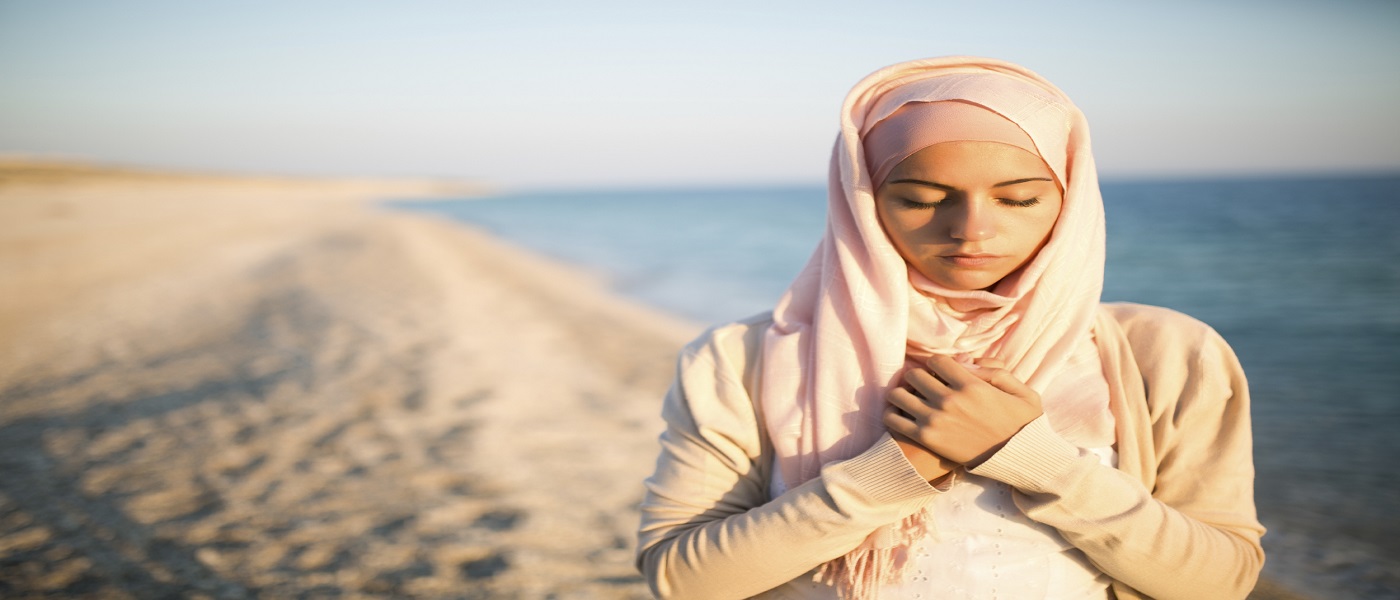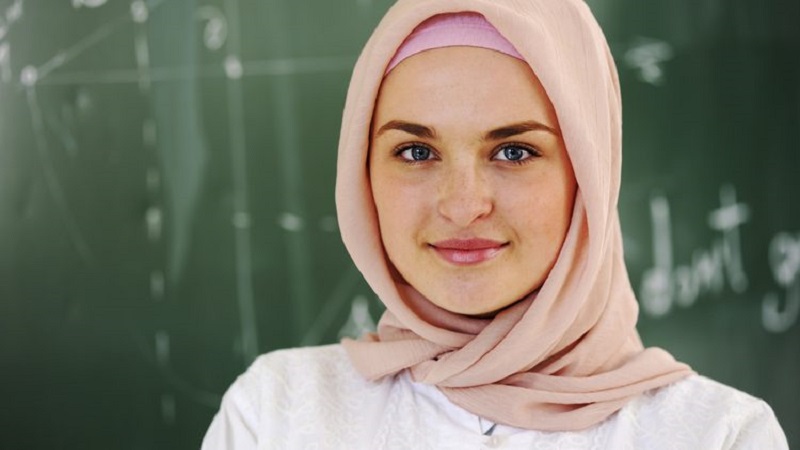

What Are Different Aspects of Hijab in Islam?
The word "Hijab"—which literally means screening or, better said, protecting something from the view of others—refers, in the Islamic context, to a kind of attire or a piece of clothing that covers a woman's body and hair.
Different Aspects of Hijab in Islam
Hijab Elevated the Status of Women
Not long before the advent of Islam were women regarded as objects of men's lust; female children were buried alive. To be brief, women were subject to physical exploitation and degradation. Islam, however, elevated women's status in society and granted them equitable treatment.
This idea is underscored many times in the Quran: “And whoever does righteous deeds, whether male or female, should he be faithful such shall enter paradise and they will not be wronged] so much as [the speck on a date-stone” (4: 124); or, “Whoever commits a misdeed shall not be requited except with its like, but whoever acts righteously, whether male or female, should he be faithful such shall enter paradise, provided therein without any reckoning” (40: 40). There are copious other examples in this regard.
Hijab Includes Men as Well
The fact that Hijab (in Islam) is not exclusively for women is equally important and worthy of attention; men also should be heedful of their clothing and their behavior. As a matter of fact, the Holy Quran first speaks of the word 'Hijab' about men and then women: “[Prophet], Tell the faithful men to cast down their looks and to guard their private parts. That is more decent for them. Allah is indeed well aware of what they do. And tell the faithful women to cast down their looks and to guard their private parts, and not to display their charms, except for what is outward, and let them draw their scarfs over their bosoms, and not display their charms except to their husbands, or their fathers, or their husband's fathers, or their sons, or their husband's sons, or their brothers, or their brothers" sons, or their sisters" sons, or their women, or their slave girls, or male dependants lacking [sexual] desire, or children uninitiated to women's parts. And let them not thump their feet to make known their hidden ornaments. Rally to Allah in repentance, O faithful, so that you may be felicitous” (24: 30-31).
Hijab Secures the Marriage
One out of the many benefits of the Hijab is to preserve and secure the stability of marriage, but how? Dressing modestly reduces extramarital sexual tensions between men and women.
Hijab, in essence, obliterates the ill thoughts of sick minds. In social interactions also Hijab does urges men and women to focus on the personality of each other, to build their relationship upon respect, virtue, and decency. In this way, they protect and propagate chastity and morality in society.
There are many great examples of chaste and pious women in the history of Islam who have tremendously contributed to the advancement of Islam and humanity in general.
Hijab Makes You Stronger
As a key Islamic value, Hijab is consistent with human nature. Men and women are by nature in favor of maintaining their dignity and self-esteem, and Hijab paves this way; it gives them an inner strength and empowers them to tell the world their decency and virtue cannot be compromised. The result is inner peace.
Hijab and Society
Therefore, from the teachings of the Quran, we come to realize that Hijab is the best principle (or code of conduct, if you will) that guarantees a better condition for male-female interactions in society because it keeps rampant desires on a tight leash. On a larger scale, observation of the Hijab prevents the society from falling into corruption and degeneracy.
We also realized that Hijab is not merely limited to the physical covering of the head and body; in fact, the physical Hijab must be accompanied by the Hijab of the heart and the mind.
Amidst the hustle and bustle of everyday life—with its common pitfalls and concealed traps—Hijab is truly a liberation beyond measure; it frees us from the slavish imitation of pseudo-liberal fashions that appear by day and vanish by night. It is a shield that protects our honor and helps us focus more and more on our superior goals.
Share This Article

Fatimah (AS) the Daughter of Prophet Muhammad (PBUH&HP)
The status of Fatimah, the most beloved daughter of Prophet Muhammad (PBUH&HP) and Khadijah, is so great within the religion of Islam that our last prophet has said: “Fatimah (AS) is part of me, whoever annoys her, annoys me and whoever pleases her, in fact, he/she pleases me” [1] He has also said: “Fatimah (AS) is the leader of the women of the worlds and a role model for all Muslim women” [2].
The history of Islam has witnessed the immense respect that the Prophet (PBUH&HP) had for Fatimah Zahra (AS) which also reflects the importance of women in society. In pre-Islamic times when Arabs would bury their daughters alive, Allah revealed the Chapters of al-Kawthar, and Dahr with the birth of Fatimah (AS) to praise her [3].
According to some Quran commentaries, when the Quraysh tribe [i] said that the Prophet (PBUH) had no offspring, the chapter of al-Kawthar was revealed:
“Indeed We have given you abundance (al-Kawthar);
So pray to your Lord and sacrifice,
Indeed it is your enemy who is without posterity” (108:1-3).
Al-Kawthar means the abundant good, i.e., the abundant offspring that the Prophet (PBUH) would have through his daughter Fatimah Zahra (AS) especially after the death of his son (Qasim), which made the Quraysh men say he was cut off from male children. In fact, this was a reply to those people and their effort to weaken the Prophet's spirits just because he did not have a son [4].
Childhood of the Fatimah (AS), the Daughter of Prophet Muhammad (PBUH&HP)
Fatimah (AS), the daughter of Prophet Muhammad (PBUH&HP) was born on the 20th of Jumada al-Thani (the sixth month of the Islamic Lunar calendar), five years after Muhammad (PBUH)’s prophetic mission (Be’that).
After losing her mother as a young child, she looked after her father so devotedly that Muhammad (PBUH&HP) used to call her “Umme Abiha”, i.e., the mother of her father. This was a really hard time for the family because Abu Talib (the leader of Banu Hashim [ii] and the prophet’s uncle) who was the protector of Muhammad (PBUH&HP) from the animosity of the Quraysh also died in the same year as Khadijah.
So in Fatimah’s (AS) early childhood, there was no place for leisure and playing childish games. Rather, she fulfilled an important role accompanied by motherhood characteristics in her father’s life with all the suffering, mockery, and humiliation he was facing. She would comfort him, empathize with him, relieve his pain, and take care of him with kindness [5].
Marriage
When it was the right time for the daughter of Prophet Muhammad (PBUH&HP), Fatimah (AS), to get married, and after her cousin, Ali ibn Abi Talib (AS) proposed to marry her, the Prophet (PBUH&HP) consulted with her and asked if she would accept his marriage proposal. In fact, Muhammad (PBUH&HP) wanted to encourage Muslims to also seek their daughters’ opinions and avoid wrong pre-Islamic beliefs about girls.
When Fatimah (AS) was asked about this (Ali (AS)’s proposal), she respectfully sought her father’s advice and the Prophet (PBUH&HP) said: “God has authorized this marriage”. Fatimah (AS) then replied that she was satisfied with what Allah and His Prophet (PBUH&HP) were pleased with.
Fatimah (AS) was the model of Prophet’s teaching among women just as Ali ibn Abi Talib (AS) was the best embodiment of his instructions and manly qualities among men; they were the most suitable couple to be married. So after receiving Fatimah’s (AS) consent, their marriage took place in the simplest possible manner [6].
A few days later, the Prophet (PBUH&HP) called on his daughter and asked her how she had found her husband. She said that he was the best companion in devotion and obedience to God. Later, he asked Ali (AS) how he had found his wife, and he said that he found her the best companion in giving service to the Creator.
Fatimah Zahra (AS) aided her husband in his worldly and religious affairs and cooperated with him in achieving his exalted goals. She was responsible for the household work; made dough, baked bread, and cleaned the house; in return, Ali (AS) vouched to take care of the outside work [7].
It has been narrated that once Imam Ali (AS) saw that Fatimah (AS) had been working so hard that she got blisters on her hands. He decided to ask the Prophet (PBUH&HP) for a housekeeper. But Prophet Muhammad (PBUH&HP) said that he would teach them something instead that would do them better than having a housemaid. He told them to recite the Tasbih of Fatimah Zahra before sleeping; that is 34 times “Allahu akbar,” 33 times “al-hamdu lillah,” and 33 times “Subhan Allah.”
It is strongly recommended to say this Tasbih [iii] as a devotional act after each prayer.
Children
God bestowed upon Fatimah (AS) and Ali (AS) four children; two sons, Hassan (AS) and Hussain (AS), who were the second and the third Infallible Imams; and two daughters, Zainab (AS) and Umme Kulthum (AS).
Fatimah (AS) portrays excellence in her role as a mother and displays a model for all the God-fearing parents in the upbringing of her four children. It has been narrated by a companion of the Holy Prophet (PBUH&HP) that one day the daughter of Prophet Muhammad (PBUH&HP) was busy grinding some grain when her older son Imam Hassan (AS) started crying. The companion offered to help her with comforting the child, but Fatimah (AS) preferred to take care of her son herself. This shows how important it is for a child to have her/his mother around her/him as much as possible since only a mother can truly soothe her child and no one else can be as much of comfort as a mother [8].
She always read passages from Quran when she put her children to sleep in the crib and so they all grew up hearing Quran from their infancy, and the words of God became etched upon their young hearts. Through such osmosis, the Quran and the children of Fatimah (AS) became inseparable for all time [9].
The status of Lady Fatimah (AS), the Daughter of Prophet Muhammad (PBUH&HP)
It has been said that this blessed family vowed to fast for three days if their sons recovered from an illness. They became well, and the family fasted for three consecutive days without eating any food giving away their Iftar (breakfast) [iv] to a beggar, an orphan, and a prisoner who arrived at their door and asked for food. The 76th chapter of the Quran (Dahr) was revealed in praise of this family and their extremely charitable act in the way of Allah [10].
“They fulfill their vows and fear a day whose ill will be widespread. They give food, for the love of Him, to the needy, the orphan and the prisoner, saying, ‘We feed you only for the sake of Allah. We do not want any reward from you nor any thanks.’ Indeed we fear from our Lord a day, frowning and fateful. So Allah saved them from the ills of that day and granted them freshness and joy. And He rewarded them for their patience with a garden and garments of silk” (76:8-12).
Fatimah (AS) actually showed such generosity and compassion for the poor that no destitute or beggar ever returned from her door unattended.
As well as being an exemplary daughter, a loving and supportive wife, and a caring mother, she played an active part as a very powerful, intellectual, and aware member of the society.
Along with all her feminine qualities, she was well-aware of her rights and whenever necessary stood up for them, instead of suffering like a helpless victim. She would make herself available for people who needed answers or clarifications on complicated issues. Her sermons and sayings are evidence of her strong character and noble mind.
She was also a very courageous lady who accompanied the Prophet (PBUH&HP) in many wars. Her genius, wisdom, determination, will-power, piety, patience, knowledge, and nobility, both in words and deeds, were inherited from her illustrious father.
In short, the existence of Fatimah Zahra (AS), the daughter of Prophet Muhammad (PBUH), along with her skills of eloquence, her political and social expertise, and powerful foresight, demonstrates how a Muslim woman can attain high spiritual and mystical positions and how a woman can play different roles powerfully, and positively influence the course of history by her social contribution [11].
Notes:
[i] A powerful merchant tribe that controlled Mecca and its Kaaba and that according to Islamic tradition descended from Ishmael. Prophet Muhammad (PBUH&HP) was born into the Banu Hashim clan of the Quraysh tribe.
[ii] A clan of the Quraysh tribe
[iii] The repetitive utterances of short sentences in the praise and glorification of Allah.
[iv] The evening meal with which Muslims end their daily Ramadan fast at sunset.
References:
Read More

Women in Islam
As a New Muslim woman, I find the Islamic lifestyle fully responsive in every aspect of my life. Here, Salam Islam deals with different issues regarding women in Islam. Salam Islam is a platform to make those who convert to Islam, more familiar with the benefits that the Islamic life can offer them.
Islam pays specific attention to women’s rights in life. The important role of women in the family, in society and their huge influence in the world, has not been neglected in Islam, as well as their personal and spiritual life is strongly protected based on Islamic lifestyle.
Let’s quickly monitor what Salam Islam provides about women in Islam;

Personal life of Women in Islam
Muslim women’s life might sound boring for those who have not chosen the Islamic lifestyle. A new convert to Islam may find herself confused in different aspects of her life. Salam Islam explains that Muslim women, better than all other women, can enjoy their lives by having lawful fun.
The issue of the Islamic dress code or Muslim women’s Hijab is also discussed from different standpoints in Salam Islam. What does Hijab mean? Is there a history of Hijab in Abrahamic religions? Why at all should they wear Hijab and cover their hair? Is there a chance that one converts to Islam without wearing Hijab? Does the Islamic dress code change from time to time and place to place, based on the conditions of time and place?
Issues Concerning Women’s Marriage in Islam
Salam Islam also covers the important issue of women’s marriage. It tries to clarify women’s rights in the family, and their rights in choosing the right spouse. Since women’s dignity and respect is very important in Islam, therefore women are free to choose a spouse based on Islamic guidelines. It is explained why Islam will allow women to marry a non-Muslim man and live under his demand.

Women’s rights in Islam in society
The issues of women in Islam are sometimes wrongly described and understood in the west. Some western people based on their shallow understanding of Islam, undermine the high status of women in the whole system of Islamic life.
Salam Islam tries to answer most of the misconceptions regarding the aspect of women’s lives in society. Are women in Islam inferior to men? Can they have a career? Why should they cover themselves in society? What about feminism and women’s rights in society?
Prominent Women in Islam and the History
Is there any practical and tangible model for the life of women in Islam? To answer this question, Salam Islam studies the life of prominent women mentioned in the Holy Quran and the history. By studying their life stories and events, one will be inspired to follow the lifestyle of such great role models to have a successful life like them.
Role models such as Saint Mary, Hagar; the Wife of Prophet Abraham, Fatimah; Daughter of Prophet Muhammad (PBUHHP), and Zainab; the granddaughter of Prophet Muhammad (PBUHHP).
If you have any questions about Mulsim women’s issues, you are welcome to send us your questions.
Read More

